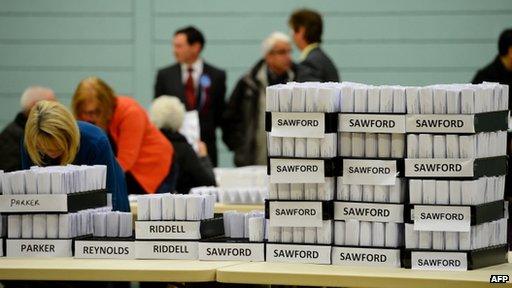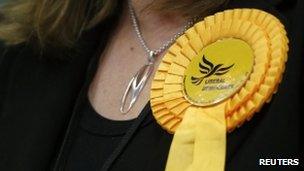Corby - why it still matters
- Published

The votes showed Labour's candidate had a winning lead
Forget for a moment the agonising over turnout in the police and crime commissioners' elections. Forget the chest thumping among the political twitterati over the supposed crisis of democracy.
The new PCCs are legitimate because many thousands of people have voted for them. They exist. They are accountable. They have power. There is an important question about how much authority they have on the back of such a low turnout.
There is also a question about why the government did not seem to put its shoulder to the wheel for such an important part of their plans to reform public services.
But it should surely be of no surprise that few people turned out to vote on a dank November day for something they knew so little about.
There was little publicity and little political enthusiasm from within government, for all the many speeches Downing Street insist the prime minister has made on the subject.
But equally, it should be no surprise that 44% of people turned out to vote in Corby. People still vote when they care, when they think it matters.
They voted in Corby because they wanted to back a candidate, send a message, express their anger and all the other reasons why people bother to go to the polls.
And as such, it is an election from which we can draw a few gentle conclusions.
1. One is that Labour can win by-elections when they put their mind to it, and throw some resources at it. They got their vote out and they picked up other votes elsewhere. But it cost them time, effort and money. They will not be able to repeat this every time.
2. This was a big win for Labour but it was not a massive win. A 12% swing is good but it is not a swing in the upper teens that gives an opposition party a real sense of momentum.
3. The Tories were not wiped out. Despite everything, despite Louise Mensch, the recession, the chaotic campaign, more than 9,000 people still chose to vote Conservative in Corby. But they are vulnerable if squeezed by Labour from the left and UKIP from the right.

Voters stayed away from the Liberal Democrat candidate
4. UKIP did well, coming a strong third with 5,000 plus votes, their best result yet in a by-election. They are clearly the recipient of votes from people frustrated with the largest parties, a role that used to be filled by the Liberal Democrats. And UKIP present a clear threat to the Tories. Hardening up their line on Europe will not be enough. People who vote for UKIP are motivated as much by disillusionment with mainstream politics as they are with opposition to the European Union.
5. The Liberal Democrats had a shocker. It does not matter whether or not they lost their deposit. What matters is that they have yet to find a winning formula that stops their supporters defecting or staying at home. They need to find something before 2015.
The bottom line is that this is a mid term by-election. Labour will be temporarily cheered, the Tories touchy, and the Lib Dems downhearted.
But the political caravan will move on. What matters is the economy and what George Osborne does or does not do when he gives his autumn financial statement on 5 December.
That will determine what happens at the next election far more than how many voters bothered to turn out on a damp November day in east Northamptonshire.